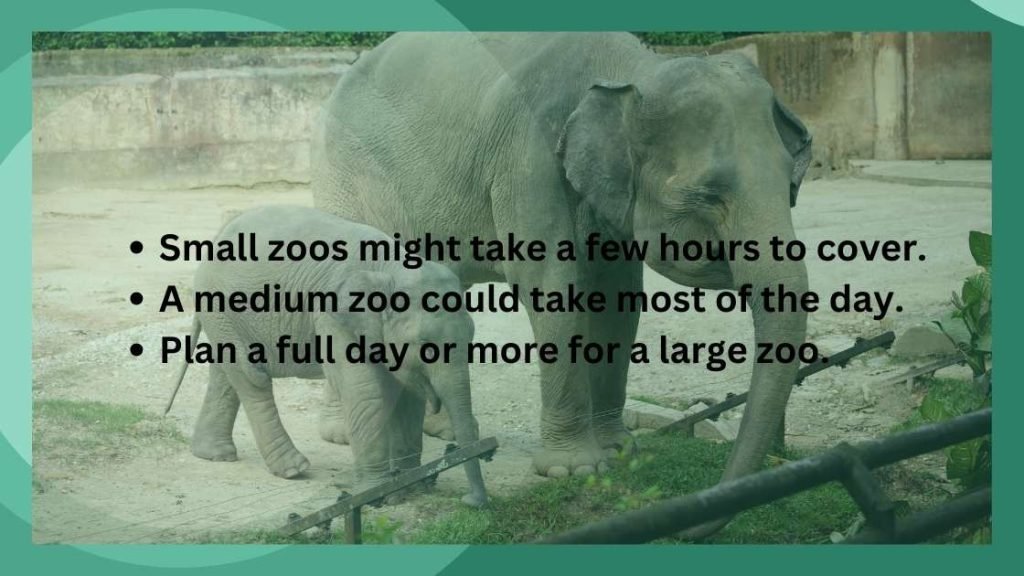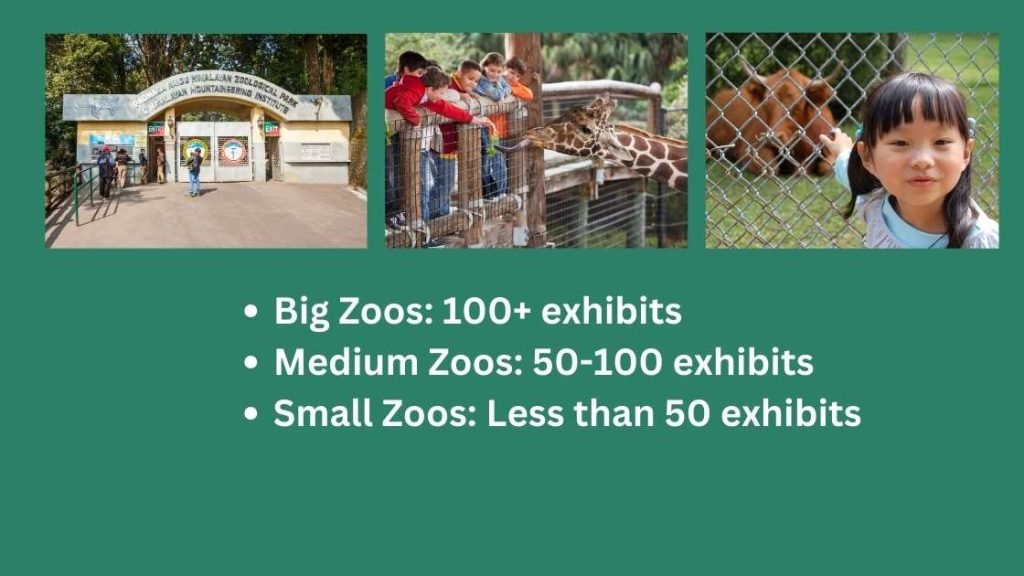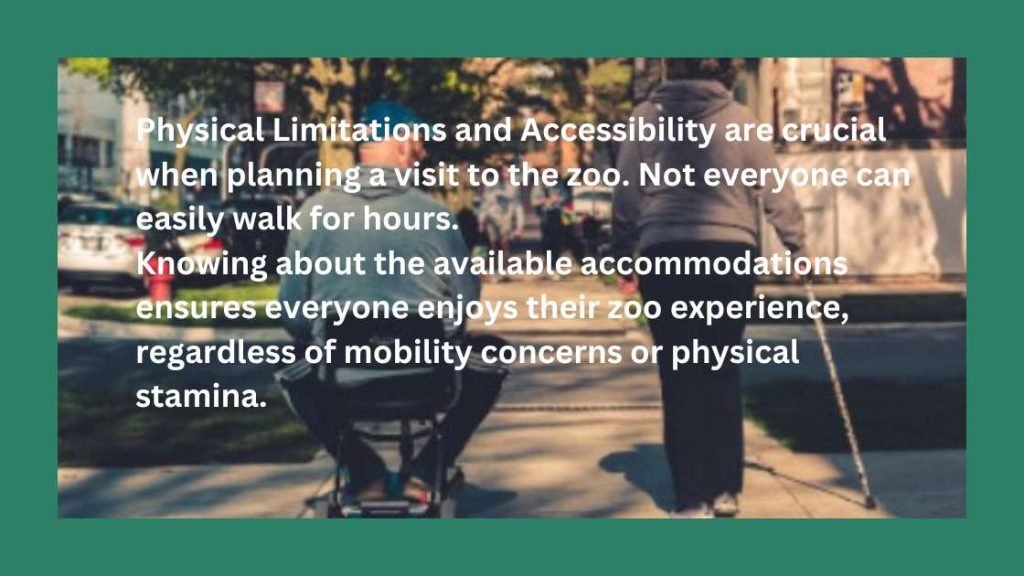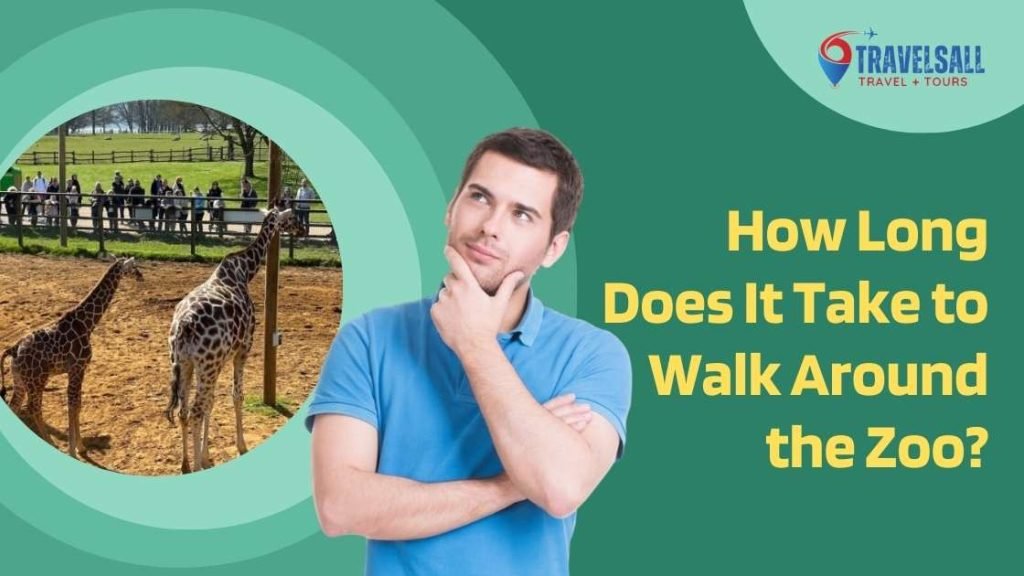The time it takes to walk around a zoo varies, typically ranging from 2 to 4 hours. Zoos differ in size, affecting stroll duration.
Going to a zoo is like taking a fun walk with lots of cool animals. How long you stay there depends on how big the zoo is, how many exhibits there are, how fast you walk, and how much time you spend looking at each cool thing.
Zoos are like big parks with maps or apps to help you find your way. Some zoos are really big, and you might wonder, “How long does it take to walk around the zoo?” Well, it depends on the size.
Some zoos are huge and might take a long time to see everything, while others are smaller and easier to walk through. When you visit a zoo, the most important thing is to enjoy the animals and exhibits.
Take your time, investigate at your own pace, and have a fun and memorable day!
Table of Contents
ToggleThe Pace Factor: Walking Speed Variations

The Pace Factor plays a critical role in your zoo adventure. Your walking speed can change your experience. Let’s investigate how different paces affect the time it takes to stroll around the zoo.
Average Human Walking Speed
On average, adults walk at a pace of about 3 to 4 miles per hour. This speed will allow you to cover the zoo’s paths comfortably.
- Easy Stroll: 3mph (48 minutes per mile)
- Brisk Walk: 4mph (30 minutes per mile)
Speed Adjustments For Families And Groups
Families and groups often adjust their pace for a pleasant experience. Consider these factors:
| Group Type | Speed Adjustment |
|---|---|
| Families with Kids | Slower due to shorter legs and frequent stops |
| Groups of Friends | Varies, may be faster or slower based on interest |
| Elderly Visitors | Generally slower, taking time to rest |
Zoo Dimensions: Size Matters

Going to a zoo is like going on a big adventure. It might take a few hours or a whole day. How big the zoo is decides how long you’ll be there.
If you know how big it is, you can plan a trip that fits your schedule just right!
Small, Medium, Or Large Zoos
Zoos come in all shapes and sizes. Your experience will vary depending on whether you visit a small, medium, or large zoo.
- Small zoos might take a few hours to cover.
- A medium zoo could take most of the day.
- Plan a full day or more for a large zoo.
Mapping Zoo Acreage
Different zoos have different amounts of land, called acreage. This section helps you understand how much ground you’ll cover.
| Zoo Size | Acreage | Expected Walk Time |
|---|---|---|
| Small Zoo | Less than 25 acres | 1-3 hours |
| Medium Zoo | 25-50 acres | 3-5 hours |
| Large Zoo | 50+ acres | 5+ hours |
Remember, these are general estimates. Walking speed and interest levels will affect the actual time.
Attraction Density And Time

Knowing Attraction Density and Time helps visitors plan their zoo adventure better. Zoos come in many sizes with different numbers of animals and exhibits.
Not every visitor has the same speed or interest level. Some like a brisk walk while others prefer to pause and observe.
Determine the time needed to stroll around the zoo by considering the number of exhibits and the typical time guests spend at each.
Number Of Exhibits
The number of exhibits at a zoo plays a key role in how long a visit might take. Large zoos can have over a hundred exhibits, while smaller ones may have fewer.
An exhibit is a place where one type of animal lives. Check the zoo’s map ahead of your visit to know the exhibit count. A higher number of exhibits could mean a longer walking time.
- Big Zoos: 100+ exhibits
- Medium Zoos: 50-100 exhibits
- Small Zoos: Less than 50 exhibits
Time Spent At Each Exhibit
Each exhibit offers unique sights and learning opportunities. Visitors might spend from 2 to 10 minutes at one exhibit, watching animals and reading information.
Kids, animal enthusiasts, and photographers may take longer. On average, allocate about 5 minutes for each stop. Remember, time varies with personal interests and zoo activities.
| Visitor Type | Time per Exhibit |
|---|---|
| Quick Glancers | 2 minutes |
| Standard Visitors | 5 minutes |
| Detail Lovers | 10 minutes |
Multiply the number of exhibits by the time you plan to spend at each to estimate your total visit duration.
Consider breaks and meals too! Grab a stopwatch, comfortable shoes, and your curiosity for a day of fun and discovery at the zoo!
Path Planning: Maximizing Your Visit
Visiting a zoo is a fun and educational experience. Proper path planning ensures you enjoy every exhibit. Let’s craft a strategy for a memorable zoo adventure.
Designing An Efficient Route
Starting early is the key. Check the map provided by the zoo. Highlight must-see exhibits and plan your path from there. Consider these points:
- Start from the far end and work your way back.
- Visit popular animals during feeding times for the best views.
- Group nearby attractions together to save time.
Using the zoo’s app can help. Many zoos offer interactive maps that suggest the shortest routes.
Avoiding Backtracking
Backtracking wastes time and energy. Follow these tips:
- Mark exits on your map to avoid dead ends.
- Take note of rest areas and food courts.
- Plan around shows and talks to enjoy without rushing.
An efficient visit needs a well-thought-out plan. Remember, comfortable shoes make walking all day easier. Enjoy your zoo journey!
Taking Breaks: Rest And Refreshments Impact
Imagine strolling through the zoo, and seeing all the amazing animals. But walking can be tiring! It’s important to take breaks to keep your energy up.
We’ll inspect how sitting for a snack or drink can change your zoo adventure time.
Scheduled Rest Stops
Plan your breaks to stay happy and healthy during your zoo visit. Rest stops help you relax and enjoy more. Look at these tips:
- Find a rest area every hour to sit for a bit.
- Use the zoo map to find rest spots ahead of time.
- Choose shady benches to cool off on sunny days.
- Plan breaks near your must-see exhibits. That way, you won’t miss a thing!
Food And Beverage Breaks
Eating and drinking keep your energy levels high. Check out how food and beverage stops can fit into your day:
| Time | Activity | Duration |
|---|---|---|
| 11 AM | Snack Break | 20 minutes |
| 1 PM | Lunch Time | 40 minutes |
| 3 PM | Refreshment Stop | 15 minutes |
Pack snacks or plan to buy them at the zoo cafes. Water is important! Carry a bottle or buy drinks to stay hydrated.
Interactive Experiences: Extending Your Stay
Are you planning a day at the zoo? Wondering how long a trip around your favorite animal exhibits will take? The basic walk may only take a few hours, but there’s so much more!
With interactive experiences woven throughout, you can truly make a day of it. These engaging stops allow visitors of all ages to immerse themselves in the wonders of wildlife.
From feeding giraffes to watching dolphins leap, each interactive moment could add a delightful extension to your journey through the zoo.
Feeding Areas
Grab a cup of nectar or a handful of greens and be ready for an unforgettable encounter! Feeding areas at the zoo let you come face-to-face with hungry critters.
Watch their excitement as you offer them a snack. These areas often have set times, so plan accordingly.
- Giraffe Feeding Station: Open from 11 AM to 2 PM.
- Bird Aviary: Nectar cups are available throughout the day.
- Goat Yard: Hand-feed these friendly animals anytime.
Shows And Presentations
The zoo isn’t just about seeing animals; it’s about experiencing them. Live shows and presentations throughout the day bring the animal world to life.
They’re perfect for a quick rest and offer intriguing educational content to delight the curious mind.
| Event | Time | Location |
|---|---|---|
| Sea Lion Splash | 1 PM & 3 PM | Marine Theater |
| Birds of Prey | 12 PM & 2 PM | Aviary Stage |
| Reptile Encounter | 11:30 AM & 2:30 PM | Reptile House |
Physical Limitations And Accessibility

Physical Limitations and Accessibility are crucial when planning a visit to the zoo. Not everyone can easily walk for hours.
Knowing about the available accommodations ensures everyone enjoys their zoo experience, regardless of mobility concerns or physical stamina.
Wheelchair And Stroller Considerations
Zoos strive to be accessible for all visitors. Many paths are wheelchair and stroller-friendly. Wide walkways and ramp access to exhibits are common. Zoos often offer wheelchair rentals. Check the zoo’s website for rental options before visiting.
Bathrooms and dining areas typically have accessible features. Look for accessible parking spots near the entrance.
Fatigue And Walking Alternatives
Walking for long periods can lead to fatigue. Zoos understand this and offer solutions. Here are choices for visitors needing a break:
- Rest areas scattered throughout the zoo
- Benches or seating near exhibits
- Rental electric scooters in some facilities
- Monorails or trams that tour the zoo
You can find zoo maps at the entrance. Maps highlight rest spots and transportation routes. Plan your visit with regular breaks, especially if walking is difficult.
| Accessibility Option | Benefit |
|---|---|
| Wheelchair-friendly Paths | Easy navigation |
| Accessible Viewing Areas | No one misses out |
| Trams and Monorails | Less walking, still sightseeing |
| Rental Scooters | Independence for mobility-impaired visitors |
Real-time Factors: Weather, Crowds, And Seasonal Hours
Getting ready for a zoo trip is more than just choosing a day. Think about things like the weather, how many people will be there, and when the zoo is open.
These things can affect how much time you spend seeing all the cool animals.
Weather Influence On Walking
The sky’s mood affects your zoo day. Sunshine means sunglasses out; you walk faster through exhibits. Rain can slow you down. Sometimes, parts of the zoo close in bad weather. Check the forecast before you go.
Crowd Levels
Crowds can change your pace. On busy days, you might wait more to see popular animals. Quiet days are different. You walk from one exhibit to another with no wait. Visit on a weekday if you can. It’s less crowded than on weekends.
Zoo Operating Hours And Timing
| Season | Hours |
|---|---|
| Spring/Summer | 9 AM – 7 PM |
| Fall/Winter | 9 AM – 5 PM |
Zoos often have longer hours in the summer and shorter hours in the winter. Plan your visit during the zoo’s open hours. Go early to use all the time you can. The last entry might be earlier than closing time. Check the zoo’s website for details.
Frequently Asked Questions For How Long Does It Take To Walk Around The Zoo
How Long Do People Usually Go To The Zoo For?
Most visitors spend an average of 2 to 4 hours exploring a zoo. The duration can vary based on the zoo’s size and the visitor’s interest level.
How Long Does It Take To Go Through A Zoo?
The time to investigate a zoo varies, typically taking 2-4 hours, depending on its size and the visitor’s pace.
How Long Does It Take To Walk Around La Zoo?
Walking around the LA Zoo typically takes about two to three hours, depending on your pace and interest in the exhibits.
How Long Would You Spend At The Zoo?
A typical zoo visit can last 2-4 hours, allowing sufficient time to see the main exhibits and enjoy a leisurely walk.
Conclusion
Walking around the zoo takes different amounts of time. It depends on how fast you walk, how big the zoo is, and which exhibits you visit. Plan to spend a few hours for a fun time. Don’t forget, the journey is just as important as seeing all the animals. Plan and have fun with each step!



